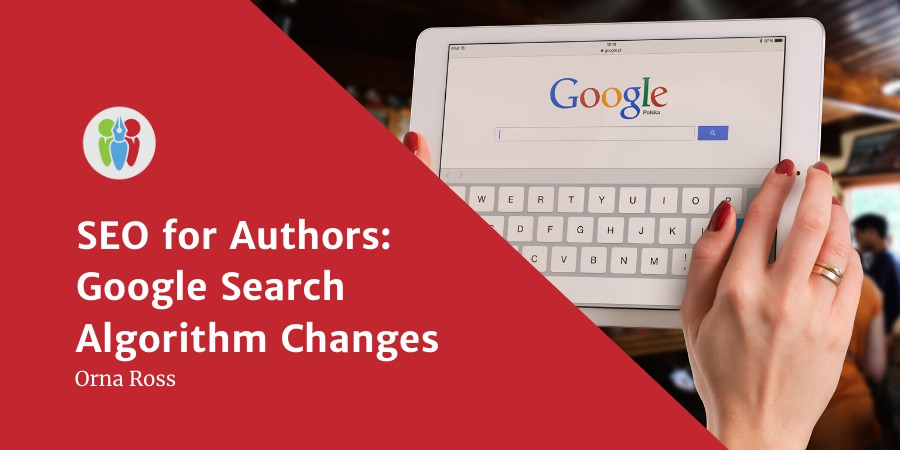If there's one thing we can all be assured of in our industry, it's that change is a constant. We've long run this daily blog, with mostly short guest posts by our members, interspersed with slightly longer advice and opinion posts from our team and ALLi Advisors. But algorithm changes at Google Search now call for a change of format. Orna Ross explains SEO for authors: Google Search algorithm changes. And what they mean for this website — and for you.

Orna Ross, Director of ALLi
SEO for Authors: Google Search Algorithm Changes
In late fall of 2019, a Google Search induced panic went up among SEO experts. Once again, without warning, Google had changed its algorithm, wreaking havoc. Many formerly high-ranking websites and businesses fell to mediocre or poor placements.
This is nothing new and byy now most have been restored to their former glory, though not all. This time Google responded with a rare statement explaining that it had begun using “neural matching” to generate local search results, giving us a glimpse into their closely guarded algorithm and machine learning (ML) secrets.
In essence, Google no longer just reads search terms but now also interprets subtext and context, through natural language processing. Like much other ML, it's moving ever further from the old stereotypical robot that took everything literally, and was incapable of nuance. Google Search can now “understand” and “guess” what you mean when you're searching, even if you can’t quite describe it yourself.
This, and previous Search updates like Hummingbird, largely bring good things for authors who are serious about their work, when compared to those whose interest is to game the system for commercial benefit only. SEO-optimizing, content-churning large companies staking a dominant claim on keywords, who fail the test of providing useful information, compelling entertainment, or true inspiration, have been downgraded. Those who offer great value to readers are further favored.
So what do Google's changes mean for you, as an indie author with a website, perhaps a blog and content marketing strategy, and a desire to sell books and establish yourself in your genre, niche and sub-niche?
SEO and Google Search Algorithm Changes for Novelists and Poets
Whatever genre you write in, choosing the right keywords and categories for your books, and for yourself as an author, is vital. So is optimizing your metadata for search, whether that's on Google Search, online retail bookstores like Amazon, Apple or Google Play, or book wholesaler feeds that feed bookstores.
On your own website, properly understanding and implementing SEO allows you to build traffic and can help you to avoid wasting time on creating content creation that no one is likely to find or read. Done properly SEO can help readers to find your book on your website, and on other online retailers that score highly for keywords in Google, and run search engines themselves.
And there are indications that author reputation will be counted in search algorithms now, though any such weighting is likely to be small in the scheme of SEO things.
Beyond ensuring you’ve got those keywords, categories and other metadata basics right (which can be quite a process in itself), how SEO plays out depends on your business model, your creative and commercial goals for your content marketing, and the type of book you write.
It's received wisdom to say that SEO is more relevant to nonfiction than fiction or poetry. Let's take a closer look at that.
When it comes to trying to attract readers to your website through SEO search, you have to realistically assess your chance of scoring highly for particular keywords, against other people who will be vying for that number 1,2 or 3 space. It's impossible for indie authors, especially those starting out, to rank for any obvious search keyword like “historical fiction” or “best thrillers”.
To feature up top in a category, any category takes time, thought, and energy. No matter how small the category, it's likely that if there are only a few posts on your blog (or other blogs or podcasts) about that particular topic, you will not score highly for it. What you need to do, to score in Search, is take some aspect of your writing that you want to be known for, and become significant and authoritative in that.
That's easier for non-fiction writers, yes, but that's not the same thing as saying there's no point in doing SEO if you write fiction or poetry. It's harder but of course, it can be done. And may be very worthwhile, particularly if your business model entails selling other products or experiences in addition to books.
Novelists and poets need to think creatively about how readers search for books, and how that might relate to aspects of theme, topic, setting, plot lines, and so on, and to their creative and commercial goals. Based on that, they can come up with a content marketing plan and SEO strategy.
ALLi Blog Changes
What do the Google Search algorithm changes mean for ALLi's Self-Publishing Advice blog?
We'll no longer be posting short blogs each day. Instead, we'll publish one long, authoritative post a week, an “all you could want to know” guide, jam-packed with information, links and resources, links, including ALLi's best practice advice.
We'll still welcome contributions from our members, but as member case studies, illustrating a point or sharing an experience.
Tuesday news, Wednesday's advice podcast, Sunday's inspirational indie author interview and our monthly watchdog post remain. We are conducting a content audit on the blog and we will be amalgamating, and improving old posts, updating everything and deleting anything that does not offer 100%, up-to-the-minute value.
And we’ll then be improving navigation And the site map, so that finding what you need is easier for you.
SEO for Authors: Google Search Algorithm Changes: Nonfiction
If you're a nonfiction author, with a content marketing strategy, you may need to take a close look at your SEO in the light of these changes, and do something similar
For more information on how your strategy might alter:
- Lots of information on SEO and the changes in 2020 read this meaty but extremely useful Backlinko post here.
- For a content marketing strategy for nonfiction books and business listen to The Smart Passive Income Podcast episode 386 here.
- How to do a content audit and an upgrade strategy for your blog, The Smart Passive Income Podcast episode 200 here.
OVER TO YOU
Have you done a content review and changed up your blog or content marketing strategy?
If you enjoyed this post you might like these from the ALLi archive:





Great blog! Do you have any hints for aspiring writers?
I’m hoping to start my own blog soon but I’m a little lost on everything.
Would you propose starting with a free platform like WordPress or go for a paid
option? There are so many options out there that I’m completely overwhelmed ..
Any tips? Thanks a lot!
I got what you mean, appreciate it for putting up.
Woh I am glad to find this website through google.
Again, it’s one of those when when I say, ‘Just when I knew all the answers, they went and changes all the questions.” As a fairly new writer, I’m stumbling along, attempting to get a foothold in marketing and having people notice my books, then they change the rules….again. The only certain thing we can count on is change, and not always for the better if you are an independent doing all your own writing and marketing, arranging for covers, editing, and so forth. If you are working, you time is limited and this just makes things more complicated.
Back to the old drawing board and working to make sure what little content I have on my website is up to date, relevant and meaningful. Oh, I try to do that without the changes…yeah. Not to much to change. I get what Google, Bing, Amazon and all the rest of the search engines are doing. It would be nice if the spammers were put out of business, leaving space for the little people to get a toe hold, but the dishonest ones will find another way of scamming the system which is sad and frustrating for those of us who are legitimate.
Barbara
So let me get this straight; ALLi is changing its format not because it is what best suits its audience, but rather, it is what best suits Google. Have I got this right?